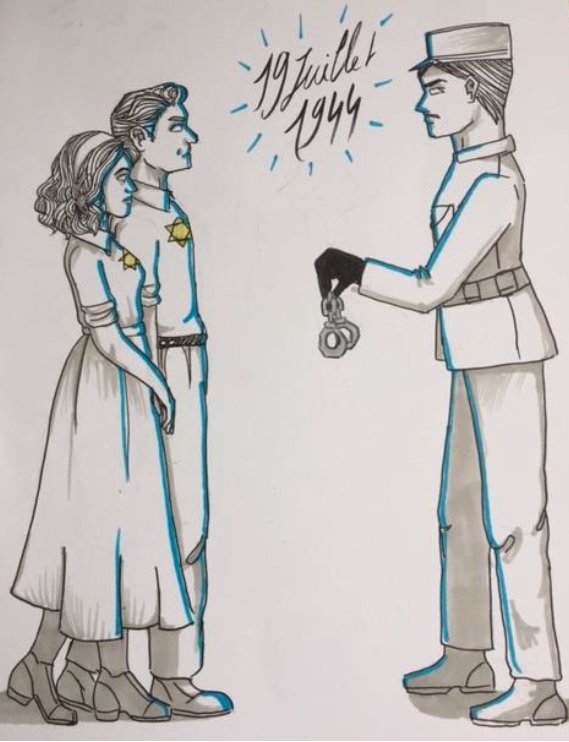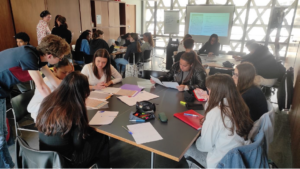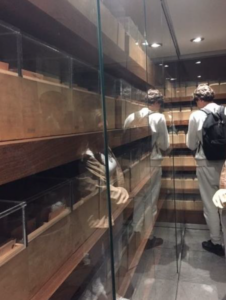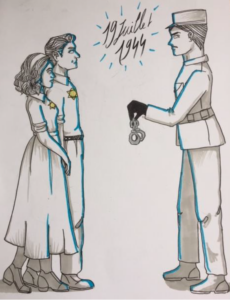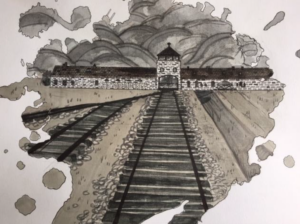Marie BERKOWICZ
Our approach to the project
In November 2022, we introduced our 12th grade History, Geography, Geopolitics & Political science students to the idea of writing the biographies of a couple who were deported during the Second World War: Marie and Jacques Berkowicz. The majority of the students were enthusiastic about the project, so we promptly organized an initial methodological session to familiarize them (around ten students for each deported person) with the work involved in analyzing historical records. We began with records from the French Defense Historical Service in Caen, in Normandy, where the DAVCC (Division archives des victimes des conflits contemporains, or Victims of Contemporary Conflicts Archives Division) holds archives on civilian victims of both the First and Second World Wars. Most of the items in the file date from the post-war period (mid-1950s), and tell the story of Marie Berkowicz’s efforts to be officially recognized as having been deported for political reasons and to qualify for compensation. These records provided us with information on Marie Berkowicz’s marital status and where she lived both before and after the war. Right away, two contradictory pieces of information about Marie’s date of birth and the date on which she was deported prompted the students to put forward a number of hypotheses.
Once we had all finished the mock exams for our specialist subjects, we resumed the work of completing our collection of records, retracing the main events in Marie’s life before and during the war, and trying to solve the enigma surrounding her date of birth and the date on which she was deported. Two women were instrumental in making this possible. An old friend, Isabelle Zdroui, who was a hidden child during the war and is also an enthusiastic local historian, sent us documents from the archives collection in Orsay, where Marie lived prior to the war; she also provided us with some information about Marie’s sister-in-law, held by the French Defense Historical Service in Caen, in Normandy, which enabled us to find out a little more about Marie. We also contacted Claire Stanislawski, an archivist at the Shoah Memorial in Paris, who we met on May 16, 2023. Ms. Stanislawski had found some new wartime records for us. These included some individual 1940 census records from the Seine prefecture, which include information on Jacques’ and Marie’s marital and professional status, as well as the dates on which they were arrested and deported. The personal check sheets produced by the Seine prefecture in 1941 and the Drancy camp internment records also added to our collection.
We thus gained an insight into the key period in Jacques’ and Marie’s lives: their occupations and the dates on which they were arrested and deported. In addition, one of the students contacted the Arolsen archives service in Berlin, which sent us the list of prisoners deported from Drancy to Auschwitz on July 31, 1944.
Our workshop at the Shoah Memorial in Paris
Biographical note
Marie Berkowicz’s maiden name was Kupferberg or Kuperberg. On the Convoy 77 deportation list, it is spelled Krygerberg. She was born on April 4, 1924, in the 12th district of Paris. This is the birth date mentioned most frequently, and indeed given by Marie herself, on a civil identity form that she signed in November 1953. The birth register states that Marie was born on April 4, 1924 at 4:50 p.m. at 15 rue Santerre, in the 12th district of Paris. A quick Google Maps search revealed that this was in fact the Rothschild hospital.
However, various other records, such as a slip from Drancy camp, a letter from the French National War Veterans’ Office and a list of deportees from the Shoah Memorial in Paris all state that she was born on April 17, 1924, and in some cases mention both dates. Very early on in their research, the students began to wonder about this. Might these refer to someone else of the same name? Could it have been a simple mistake? Might Marie have lied about her real date of birth during the war, and if so, why?
Marie’s parents, Samuel and Gitla
According to a 1936 memo from the Naturalization Department of the French Ministry of Justice, Marie’s father was a Polish citizen by the name of Samuel Kupferberg and was born on July 17, 1895 in Radom, Poland, 60 miles south of Warsaw. However, according to the birth register, Samuel was born on July 10, 1895. Samuel’s parents, Marie’s grandparents, were Szmerk Kupferberg and Fajda Nacha Frajman.
Marie’s mother was also Polish: she was called Gitla Zylberberg and was born on May 25, 1895 also in Radom. Gitla’s parents were Majlich Icek Zylberberg and Chana Ruchla Grynberg.
Samuel was a tailor, while Gitla did not work. According to their marriage certificate, translated from Polish by one of the students in our school, Gitla Zylberberg married Szmul-Wigdor Kupferberg (also known as Samuel Kupferberg) on June 16, 1918 in Radom. They were married by the rabbi of Radom, Chil Kestenberg, and the witnesses were both teachers. According to Marie’s birth certificate, the family lived at 33 rue Pali Kao, which was in a working-class neighborhood called Belleville in the 20th district of Paris. We do not know when they first arrived in France.
According to her death certificate, which was issued by the town hall in Orsay, in the Essonne department of France, on July 24, 1964, Gitla was divorced from Samuel Kupferberg. According to a birth certificate issued by Orsay town hall, Gitla had a second child after Marie. He was called Roger Jacubowicz and was born in Orsay on June 6, 1931. His father was Jacob Jakubowicz, a second-hand goods dealer born in Poland on January 13, 1899. At that time, they were living on Avenue des Platanes in Orsay.
Gitla was deported and murdered. According to the Orsay archives, and specifically the 1956 Orsay death register, Gitla supposedly died in Auschwitz on November 16, 1942. However, according to several people who later gave evidence to the French Ministry of Veterans’ Affairs, Gitla actually died in 1943: a letter from a Mrs. Dora Lipskind states that she died in the summer of 1943 in lager B, while a letter from a Mrs. Ita Friedman states that Gitla died of dysentery in the Birkenau infirmary, block 27, lager B, in July ‘43. Her body was burned in the crematorium.
Marie’s life before she was arrested
Marie became a French citizen by naturalization on January 30, 1935, when she was ten years old. In December 1936, according to a note from the Naturalization Department, she was living at 74 rue de Dunkerque in the 9th district of Paris.
In October 1940, the Vichy government ordered a census of Jews in the occupied zone. Marie’s census form can be found in the Shoah Memorial archives. At that time, she declared that she lived at 17, rue Thiers in Grenoble, in the Isère department of France. Jacques, her future husband, gave the same address in Grenoble on his form. However, that census was only carried out in Paris. Were Marie and Jacques lying when they gave the address in Grenoble? Or were they really living in Grenoble, but just happened to be in Paris at the time? There is a second census record for Marie in 1941. She once again gave the address in Grenoble, while Jacques declared that he was living on the Boulevard Saint-Martin in Paris.
The students looking at the files from the prefecture during their visit to the Shoah Memorial in Paris in May 2023.
Through a procedure known as “denaturalization”, Marie’s French citizenship was rescinded on July 13, 1941. Jacques too was “denaturalized” in December 1941. In February 1942, according to a note made by the Chief of Police in Palaiseau, Marie was living at 50 rue de Monthléry in Orsay. The Police chief also noted that Marie’s identity card (card no. 40-ALOI278) was stamped with the word “Juive”, meaning “Jewish”.
On April 15, 1943, Marie married Icchok, also known as Jacques, Berkowicz, who was born on August, 1919 in Warsaw, Poland, in Montauban, in the Tarn-et-Garonne department of France. This information comes from their French family record.
The fact that Marie lived in so many different places, and that she married Jacques in another, is astounding. At a time when identity checks on Jews were becoming increasingly frequent as the war unfolded, how could Marie have moved around so often, not only within the Paris area, but also in various other French town and cities? Why would she have taken such a huge risk?
Before she was deported, Marie’s last known address was 59 Boulevard de Monthléry in Orsay. This was also the address given on the medical report drawn up by the French authorities when she returned to France. However, when she applied to be officially recognized as having been a deported person, she gave the address at which she was staying when she was arrestd, which was the Hotel Clignancourt, at 65 rue de Clignancourt in Paris. Lastly, the Auschwitz arrival register lists her address as 5 rue de l’Asile Popincourt, also in Paris. It should be noted that these same addresses are given in the records relating to Jacques. This confirms that they were living together before they were arrested.
Marie’s arrest
Together with her husband, Jacques, Marie was arrested on July 19, 1944 during an identity check on Place Voltaire in Paris (according to her application form for deported persons status) or on July 20, 1944 (according to an official memo, probably from the Ministry of Veterans’ Affairs).
She was deemed to have “no legal status”, and was interned in Drancy from July 22 to July 30, 1944, where she was registered as number 22550. Jacques was interned at the same time under number 22549. However, during her time in Drancy, she was not held in the same room as Jacques. She was on the 3rd floor on staircase 18, while Jacques was on the same staircase, but on the 5th floor. She was listed as being married with no children. Both she and her husband were classified as “Category B” prisoners, meaning that they could be deported to Auschwitz immediately.
Drawing by Salomé Navaro (student at the Camille Claudel high school)
Deportation to Auschwitz
On July 31, 1944, Marie was deported to Auschwitz on Convoy 77, the last transport to leave France from Bobigny station. Her medical form lists her date of arrival in Auschwitz as August 3, 1944. The application form for deportation status tells us what happened next: she remained in Auschwitz until October 1944, when she was transferred to Kratzau, where she stayed until May 1945. Jacques, meanwhile, remained in Auschwitz. The Kratzau camp, in the north of what is now the Czech Republic, was in the Sudetenland in 1938, a region that was annexed to the Reich. According to Régine Jacubert, who also worked at Kratzau, it was a women-only factory. Working conditions were less harsh than in most other camps, and most of the prisoners survived. Régine Jacubert also mentioned in her testimony that a plaque was hung in the town library, 50 years later, in memory of the women who once worked in the factory. Marie’s name may well be on it.
Drawing by Salomé Navaro (student at the Camille Claudel high school)
Marie was liberated on May 9, 1945. A deportation certificate was issued on March 9, 1945. She was, however, considered to have been a deported person until June 1, 1945 (this is the date used by the French Ministry of Veterans and Victims of War). She was repatriated to France on June 25, 1945, arriving at the Sarrebourg reception center, where she was issued card number 1654060, according to the Ministry of Veterans Affairs.
A medical examination carried out in 1945 revealed that Marie had lost 11 pounds (5kg) and had a wound on her leg that had needed stitches, but her overall physical condition was deemed to be good. The report states that she had been suffering from amenorrhea since August 1944. It is well known that the failure to menstruate is associated with malnutrition. No infectious or parasitic diseases were listed. She was repatriated to France by train.
After the war
In 1955, Marie was living at 46 rue de la Folie Méricourt, in the 11th district of Paris. She was not working at the time. She applied to be recognized as having been deported and interned for political reasons. In July 1956, she was living at 19 boulevard Saint Martin in the 3rd district of Paris. That same year, the Ministry of Veterans and Victims of War awarded her 12,000 francs as compensation for having been deported or interned for political reasons (see doc. 16).
According to her death certificate, Marie died at 10:15 pm on July 16, 2009, at 2 rue de Jules Violle in Dijon, in the Côte-d’Or department of France. We searched this address on Google Maps and discovered that it is the Champmaillot geriatric hospital). Her home address at the time was 20 rue de Lorraine in Dijon.
Marie Berkowicz’s name is engraved on the Wall of Names at the Shoah Memorial in Paris, in the section commemorating people who died in 1944. Her husband’s name is one line below hers.
Were there two Marie Kupferbergs? The mystery/ mysterious of Cywja Berkowicz
It wasn’t until we had completed our research into Marie’s life that we were able to partially solve the mystery surrounding the two Marie Kupferbergs. It was only through the material that Isabelle Zdroui, our friend and former hidden child, entrusted to us that we were able to get to the bottom of the mystery.
Jacques’s sister, Cywja Bercowicz, was born on January 23, 1921 in Warsaw (according to the death register of civilian victims from the French Ministry of Veterans’ Affairs). The Drancy search log, from the Shoah Memorial, lists Cywja’s address as 20 rue Saint François de Paul in Nice, in the Alpes-Maritimes department of France. However, a death certificate extract issued by the Seine Prefecture in 1961 lists her last known address before she was arrested was 19 Boulevard Saint Martin in Paris. According to Jacques’ biography, Cywja was living with her brother at the time.
Cywja was arrested on September 28, 1943 (according to a post-war memo from the French authorities relating to granting her the status of “Died for France”). She was interned in Drancy on October 6, 1943 under the name Marie Kupferberg, born on April 4, 1924. She was searched and, according to a receipt issued by the camp authorities, was carrying the sum of 1,415 francs. She was assigned the number 6006. Her Drancy internment record card, dated October 28, 1943, clearly shows her address as 20 rue St François de Paul, Nice, and her occupation as a milliner.
During the war, Cywja lied to the French authorities about her identity. She gave her sister-in-law’s name, Marie Kupferberg, and also Marie’s date of birth. After the war, in 1959, her brother Jacques and some other witnesses testified in the French courts that Cywja had indeed used her sister-in-law’s name. Two eyewitnesses, David Sztern and Félicie Banet, née Goldberg, also confirmed that Cywja had used Marie’s name. Why did she lie about who she was? According to both witnesses, it was “due to her Jewish roots”.
Cywja was therefore deported under the name of her sister-in-law, Marie Kupferberg, on Convoy 61 on October 28, 1943. This can be seen on Serge Klarsfeld’s deportation list for Convoy 61, which lists Cywja’s alias, Marie Kupferberg, along with Marie’s date of birth, April 4, 1924. After the war, the French authorities officially declared that Cywja died in Drancy on October 28, 1944 (the day on which she was deported).


 Français
Français Polski
Polski